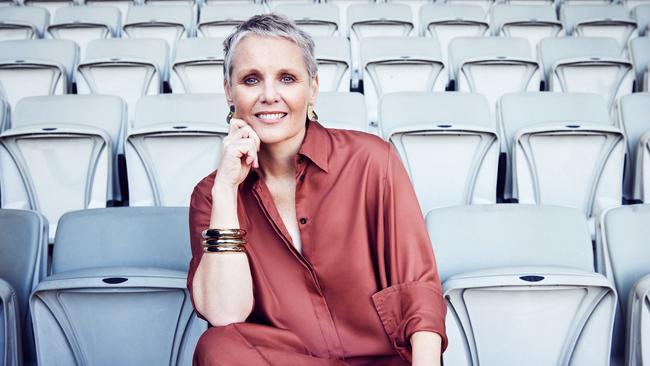Federal MP Peta Murphy: ‘Having breast cancer means people have to listen to me’
Peta Murphy, who has metastatic cancer and is currently in the middle of chemotherapy treatment, reveals how her personal experience provides an opportunity for her as a Federal MP to bring attention to the fact one in seven women in Australia are affected by breast cancer.

Stellar
Don't miss out on the headlines from Stellar. Followed categories will be added to My News.
When the Field of Women assembles at the Melbourne Cricket Ground on August 20 it will not only mark 25 years of the Breast Cancer Network Australia (BCNA) connecting and supporting people with the disease, it will also illustrate its key vision: that no-one should feel alone through their experience of breast cancer. As families gather en masse to form the signature Pink Lady silhouette – an image that poignantly represents the 20,640 people diagnosed with breast cancer each year and those who have lost their lives to the disease – Federal MP Peta Murphy explains how she has been impacted by a diagnosis
Federal MP Peta Murphy, 49, has every right to think she’s the poster woman for Murphy’s Law, the adage that the worst thing will happen at the worst possible moment. When she was diagnosed with breast cancer in 2011, aged 37, the then lawyer and her husband Rod Glover had packed up their house and were moving to the US to live. Of course, that plan had to be abandoned as she went through treatment and a double mastectomy.
But that was just the beginning. Having been advised to freeze her eggs because chemotherapy could make her infertile, Murphy backed up cancer treatment with IVF. “Despite endless rounds of IVF, I couldn’t get pregnant,” she tells Stellar, pointing out that she wasn’t the only one dealing with loss.
“It means my husband doesn’t have any children, either,” she says. “It’s no small thing for someone’s partner to go through.”

Tough, self-deprecating and funny, Murphy may not have been living the life she’d planned but cancer made her determined to do something meaningful. She decided to enter politics as a Labor candidate and, while she lost the election in 2016, she won the Melbourne seat of Dunkley in 2019.
Throughout the campaign, she’d had pain in her chest and suspected it was pneumonia, but when she went to the GP eight years after her first cancer diagnosis, she was made to feel like a drama queen. So she sought a second opinion: “They thought perhaps it was some scar tissue from my implants, so I went to a plastic surgeon who sent me for an MRI. They found, technically speaking, two whopping great tumours growing out of my sternum bone. I do remember swearing a lot.”
She also remembers going to a branch meeting that evening. “I didn’t want to let people down and I also didn’t want people to think I couldn’t do the job,” she says. To that end, she had her radiation treatment in the evenings which, in retrospect, she admits was “stupid”.
Four years later, she’s now in the middle of chemotherapy treatment and fast losing her hair. It won’t get rid of the metastatic cancer, she says, but hopefully it will stop it spreading. As she approaches her 50th birthday – her husband has organised a party – she has a unique ability to capture the vulnerability and indignity of cancer.
In a letter she wrote to herself – which is shared on the BCNA website – she tells amusingly of fainting at a mammogram (the wheeled chair slid out from under her) and shouting at a group of men in suits watching her have a wire inserted into her breast (no-one had informed her that representatives of the medical equipment company would attend the procedure).
There are also joyous moments, including winning the US Masters’ 35 years Squash Championships just three months after her mastectomy, and meeting the late Olivia Newton-John, who suffered the same cancer and publicly called Murphy her “twin”. She doesn’t focus on the singer’s death last year but on the difference she herself can now make.
“Having breast cancer means that people have to listen when I talk about it,” she says. “If I said I wanted to talk about it because it affects one in seven women in Australia then people might listen, but when I say I have metastatic breast cancer and this is what I’m going through, there’s not really much space for someone not to listen. I’ve got this opportunity to be part of some big stuff, and I’m doing everything I can to do that for as long as I can.”
For tickets and details about Field of Women or for support for a breast cancer diagnosis, visit bcna.org.au.
Stellar spoke to three women about how breast cancer impacted them in different ways. Read the full interviews inside The Sunday Telegraph (NSW), Sunday Herald Sun (VIC), The Sunday Mail (QLD), and Sunday Mail (SA) this weekend.


